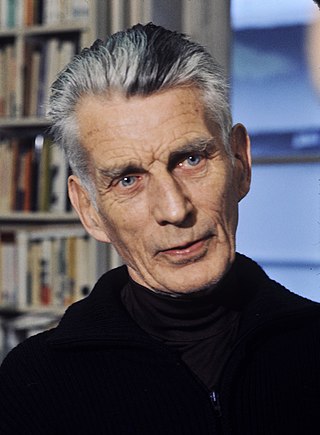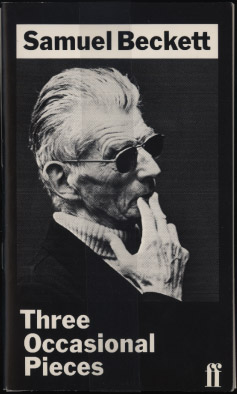Related Research Articles

Samuel Barclay Beckett was an Irish novelist, dramatist, short story writer, theatre director, poet, and literary translator. His literary and theatrical work features bleak, impersonal, and tragicomic experiences of life, often coupled with black comedy and nonsense. His work became increasingly minimalist as his career progressed, involving more aesthetic and linguistic experimentation, with techniques of stream of consciousness repetition and self-reference. He is considered one of the last modernist writers, and one of the key figures in what Martin Esslin called the Theatre of the Absurd.

Waiting for Godot is a play by Irish playwright Samuel Beckett in which two characters, Vladimir (Didi) and Estragon (Gogo), engage in a variety of discussions and encounters while awaiting the titular Godot, who never arrives. Waiting for Godot is Beckett's reworking of his own original French-language play, En attendant Godot, and is subtitled "a tragicomedy in two acts".
Play is a one-act play by Samuel Beckett. It was written between 1962 and 1963 and first produced in German as Spiel on 14 June 1963 at the Ulmer Theatre in Ulm-Donau, Germany, directed by Deryk Mendel, with Nancy Illig (W1), Sigfrid Pfeiffer (W2) and Gerhard Winter (M). The first performance in English was on 7 April 1964 at the Old Vic in London. It was not well-received upon its British premiere.

Film is a 1965 short film written by Samuel Beckett, his only screenplay. It was commissioned by Barney Rosset of Grove Press. Writing began on 5 April 1963 with a first draft completed within four days. A second draft was produced by 22 May and a 40-leaf shooting script followed thereafter. It was filmed in New York City in July 1964. Beckett and Alan Schneider originally wanted Charlie Chaplin, Zero Mostel and Jack MacGowran, however they eventually did not get involved. Beckett then suggested Buster Keaton. James Karen, who was to have a small part in the film, also supported having Keaton. The filmed version differs from Beckett's original script but with his approval since he was on set all the time, this being his only visit to the United States, as stated in the script printed in Collected Shorter Plays of Samuel Beckett.
Happy Days is a play in two acts, written by Samuel Beckett first performed in 1961. Viewed positively by critics, it was named in The Independent as one of the 40 best plays of all time.
Catastrophe is a short play by Samuel Beckett, written in French in 1982 at the invitation of A.I.D.A. and “[f]irst produced in the Avignon Festival … Beckett considered it ‘massacred.’” It is one of his few plays to deal with a political theme and, arguably, holds the title of Beckett's most optimistic work. Beckett "wrote the short play Catastrophe about control and censorship" and dedicated it to the Czech dramatist Václav Havel, who was in prison at the time. Havel wrote a play called Mistake "as a response to the one Beckett had written in solidarity." "In February 1984, in one of the most significant milestones in the history of Index on Censorship, both plays were published for the first time." In January 2022, after almost 38 years, in 50th birthday celebration of Index, they asked "Iranian playwright Reza Shirmarz to write his own response to Beckett's Catastrophe." Shirmarz wrote his play Muzzled which was published by Index as a dramatic response to Beckett's Catastrophe. Giving his viewpoints on Beckett's play in an interview with Index, Shirmarz said that "Catastrophe is about censored communication, the ritualistic representation and the symbolic image of human relationship constrained by external forces, a deterministic, political and post-dramatic text which demonstrates how humans are coerced to be and live in a torturous limbo. [In Catastrophe], Beckett's Protagonist is deprived of free will by the systems surrounding him and the systematic control imposed by others, except at the moment he moves his head up and looks at the spectators. Despite his psychosomatic pain, he talks through his silence and protests through his immobility. As so-called social factors and audiences, we are reminded by the playwright that we are not able to get out of the cage the sociopolitical conventions have imprisoned us in and we must abide by the unbreachable laws brought in by the global structures and conglomerates in order to survive."
Endgame, by Samuel Beckett, is an absurdist, tragicomic one-act play about a blind, paralyzed, domineering elderly man, his geriatric parents and his doddering, dithering, harried, servile companion in an abandoned house in a post-apocalyptic wasteland, who mention they are awaiting some unspecified "end" which seems to be the end of their relationship, death, and the end of the actual play itself. Much of the play's content consists of terse, back and forth dialogue between the characters reminiscent of bantering, along with trivial stage actions; the plot is held together by the development of a grotesque story-within-a-story that the character Hamm is relating. An aesthetically profound part of the play is the way the story-within-story and the actual play come to an end at roughly the same time. The play's title refers to chess and frames the characters as acting out a losing battle with each other or their fate.

The Criterion Theatre is a West End theatre at Piccadilly Circus in the City of Westminster, and is a Grade II* listed building. It has a seating capacity of 588.
Act Without Words II is a short mime play by Samuel Beckett, his second. Like many of Beckett's works, the piece was originally composed in French, then translated into English by Beckett himself. Written in the late 1950s it opened at the Clarendon Press Institute in Oxford and was directed by John McGrath. London premiere was directed by Michael Horovitz and performed at the Institute of Contemporary Arts, on 25 January 1960. The first printing was in New Departures 1, Summer 1959.
What Where is Samuel Beckett's last play produced following a request for a new work for the 1983 Autumn Festival in Graz, Austria. It was written between February and March 1983 initially in French as Quoi où and translated by Beckett himself.
Not I is a short dramatic monologue written in 1972 by Samuel Beckett which was premiered at the "Samuel Beckett Festival" by the Repertory Theater of Lincoln Center, New York.

A Piece of Monologue is a fifteen-minute play by Samuel Beckett. Written between 2 October 1977 and 28 April 1979 it followed a request for a “play about death” by the actor David Warrilow who starred in the premiere in the Annex at La MaMa Experimental Theatre Club, New York on 14 December 1979.
Quad is a television play by Samuel Beckett, written and first produced and broadcast in 1981. It first appeared in print in 1984 where the work is described as "[a] piece for four players, light and percussion" and has also been called a "ballet for four people."
Rockaby is a short one-woman play by Samuel Beckett. It was written in English in 1980, at the request of Daniel Labeille, who produced it on behalf of Programs in the Arts, State University of New York, for a festival and symposium in commemoration of Beckett's 75th birthday. The play premiered on April 8, 1981, at the State University of New York at Buffalo, starring Billie Whitelaw and directed by Alan Schneider. A documentary film, Rockaby, by D. A. Pennebaker and Chris Hegedus records the rehearsal process and the first performance. This production went on to be performed at the Annex at La MaMa Experimental Theatre Club, and, in December 1982, at the Cottesloe, Royal National Theatre, London.
That Time is a one-act play by Samuel Beckett, written in English between 8 June 1974 and August 1975. The play was specially written for actor Patrick Magee, who delivered its first performance on the occasion of Beckett's seventieth birthday celebration, at London's Royal Court Theatre on 20 May 1976.

Eh Joe is a piece for television, written in English by Samuel Beckett, his first work for the medium. It was begun on the author's fifty-ninth birthday, 13 April 1965, and completed by 1 May. "It [was] followed by six undated typescripts .”
Samuel Beckett wrote the radio play, Words and Music between November and December 1961. It was recorded and broadcast on the BBC Third Programme on 13 November 1962. Patrick Magee played Words and Felix Felton, Croak. Music was composed especially by John S. Beckett. The play first appeared in print in Evergreen Review 6.27. Beckett himself translated the work into French under the title Paroles et Musique.
Rough for Radio II is a radio play by Samuel Beckett. It was written in French in 1961 as Pochade radiophonique and published in Minuit 16, November 1975. Beckett translated the work into English shortly before its broadcast on BBC Radio 3 on 13 April 1976. Martin Esslin directed Harold Pinter, Billie Whitelaw (Stenographer) and Patrick Magee (Fox). The English-language version was first published in Ends and Odds as Radio II.

All That Fall is a one-act radio play by Samuel Beckett produced following a request from the BBC. It was written in English and completed in September 1956. The autograph copy is titled Lovely Day for the Races. It was published in French, in a translation by Robert Pinget revised by Beckett himself, as Tous ceux qui tombent.
Ghost Trio is a television play, written in English by Samuel Beckett. It was written in 1975, taped in October 1976 and the first broadcast was on BBC2 on 17 April 1977 as part of The Lively Arts programme Beckett himself entitled Shades. Donald McWhinnie directed with Ronald Pickup and Billie Whitelaw. The play's original title was to be Tryst. "On Beckett’s notebook, the word was crossed out vigorously and the new title Ghost Trio written next to it. On the title page of the BBC script the same handwritten title change can be found, indicating that it must have been corrected at the very last minute."
References
- ↑ Knowlson, J. and Pilling, J., Frescoes of the Skull (London: John Calder, 1979), p 231
- ↑ "Daniel Radcliffe to return to London stage in Beckett play". The Seattle Times. 2019-04-30. Retrieved 2019-07-14.